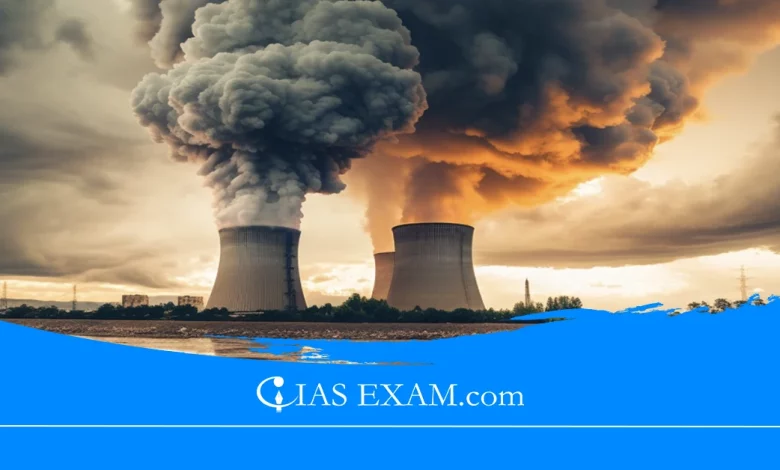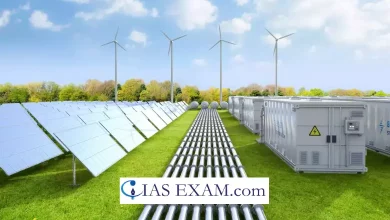Daily Current Affairs for UPSC
Nuclear Energy as Climate Solution
Syllabus- Environment [GS Paper-3]

Context
It was seen as a series of efforts to pitch nuclear energy as an important solution to global issues like climate change and energy security.
Nuclear Energy & Climate Change
- Low-Carbon Energy Source: Nuclear energy plants produce no greenhouse gas emissions all through operation, and it remains the second largest source of low carbon electricity globally and has historically avoided around 70 billion tonnes of carbon dioxide.
- According to IAEA, the complete life cycle of nuclear power plants is taken into consideration – accounting for activities like reactor creation, uranium mining and enrichment, waste disposal and storage, and other techniques – greenhouse gas emissions are only in the range of 5 to 6 grams per kilowatt hour.
- It is more than a hundred instances less than coal-fired electricity, and about half the average of solar and wind technology.
Other Benefits
- Reliable and Scalable: Nuclear energy can be deployed on a large scale and is a dependable source of energy, presenting clean, consistent, and affordable electricity.
- Substitute for Fossil fuels: Nuclear energy can immediately replace fossil fuel plants, avoiding the combustion of fossil fuels for electricity generation.
- Supports Economic Development: The use of nuclear energy can support global economic development by imparting the huge portions of electricity needed.
- Contributions to Energy Security: Nuclear energy can make contributions to energy safety by imparting a stable source of electricity.
- Potential for Heat Applications: Nuclear energy plants have the capacity to utilise more nuclear power for heat applications for future decarbonization efforts.
- Supports Decarbonization: Nuclear energy can play a key role in the transition to a smooth energy future and in achieving carbon neutrality.
Global Efforts
- Paris Agreement (2015): It is to preserve the upward push in global temperatures to below 2°C as compared to pre-commercial ranges, and with the purpose to restrict the upward thrust to 1.5°C.
- To restrict the influences of climate change, the world must hastily lessen its dependence on fossil fuels to reduce greenhouse gas emissions.
- Role of International Atomic Energy Agency (IAEA): It has launched an ‘Atoms4Climate’ initiative to talk about this and has begun an engagement with the climate community, specifically on the COPs or the annual year-ending climate conferences.
- At COP28 in Dubai, approximately 20 countries pledged to work in the direction of tripling international nuclear energy installed capability by 2050.
Challenges of Nuclear Energy and Climate Solutions
- Safety Concerns: Incidents like the Fukushima accident in 2011 have raised safety issues concerning nuclear energy.
- The ongoing disaster at the Zaporizhzhya nuclear power plant in Ukraine, the first nuclear facility to be caught in a dangerous armed conflict, has also been a source of grave concern.
- Waste Disposal: The long-term storage and disposal of radioactive waste is a complex issue that needs to be addressed.
- In 2021, Japan announced plans to launch over one million tonnes of contaminated water from the Fukushima nuclear plant into the ocean over the next 30 years.
- High Initial Costs: The initial costs of putting in place a nuclear power plant are high.
- It includes prices for protection measures that may make nuclear energy appear much less economically feasible in comparison to other electricity sources.
- Public Perception: There is frequent public opposition to nuclear energy because of fears of radiation and nuclear injuries.
- It can cause challenges in building new plants.
- Regulatory Hurdles: Nuclear energy is heavily regulated, which could slow down the development and deployment of recent reactors.
- Non-Proliferation Concerns: There are issues about the capacity misuse of nuclear technology and materials for army purposes.
Conclusion
- Nuclear electricity is a clean and environment-friendly source of electricity that’s available 24X7, and can provide the country long-term energy security in a sustainable manner.
- The increase of the Indian nuclear power program is vital to meet the twin goals of energy security and sustainable development.
Source: The Indian Express
UPSC Mains Practice Question
Q.Rising advancements in nuclear energy has its own advantages but posed several challenges. Discuss. (150 words)





.png)



